Agencies launch revised appeal for South Sudan refugees amid concerns that the numbers could pass the 1 million mark this year
Nairobi, 15 July 2016 (UNHCR) – The population of South Sudanese refugees in the region could pass the 1 million mark this year if cross-border displacement trends continue, according to Ann Encontre, Regional Refugee Coordinator for the South Sudan situation.
Launching the revised appeal of USD 701 million in Nairobi today, Encontre expressed concerns about the likelihood of fresh outflows of refugees in the wake of the recent military crisis in Juba and the dearth of funding for South Sudanese refugees.
“We have received 17% of the initial USD 638 million that we had appealed for this year,” she said. “This has forced us to prioritize emergency response and life-saving activities, at the expense of critical water, sanitation, hygiene, health and shelter interventions for refugees.”
“Although children constitute 70% of the refugee population, child protection activities including in the education sector are also severely compromised,” she added.
Noting that the overall planning figure had risen from 867,239 to 973,000, the Regional Refugee Coordinator said that in the first four months of this year, countries like Sudan and Uganda received between 70 and 90 per cent of their planned 2016 population.
Encontre commended neighbouring countries for keeping their borders open. This year, the number of countries hosting South Sudanese refugees has expanded to include the Central African Republic (10,454 refugees) and the Democratic Republic of Congo (11,966), in addition to Ethiopia (285,657), Kenya (103,104), Sudan (231,638) and Uganda (224,420).
The Regional Refugee Coordinator reiterated UNHCR’s call on all armed parties to ensure safe passage for people fleeing fighting to seek safety and asylum. She noted that while the security situation in Juba has improved since the declaration of a ceasefire on 11 July, there are disturbing reports of increasing tension and sporadic fighting in other parts of the country, including in Wau (Western Bahr-Al-Ghazal), in Leer town (Unity), and in Yei (Central Equatoria). There are also reports of civilians stranded at Nimule border town who failed to cross into Uganda.
The Regional Refugee Coordinator made a special appeal for the children who are are the worst affected by fighting in South Sudan, and of whom over half a million have been forced to flee the country.
“They are supposed to be the generation of tomorrow, the generation that will lead and rebuild their country, but right now, they are suffering enormously. They have been deprived of a normal life. Many of them are in camps or in settlements outside their country or internal displacement sites inside South Sudan. They cannot go to school, they do not have proper food, they cannot access healthcare. We are doing what we can to keep them in good health, but the challenges to cater to their needs are really enormous.”
46 UN partners along with national and non-governmental organizations in all of South Sudan’s neighbouring countries are participating in the revised appeal. 23% of the requirements are for food, amid concerns that 4.8 million South Sudanese are expected to face severe food shortages over the coming months. New arrivals in Kenya this year are citing ongoing hunger in Eastern Equatoria as the main reason for their flight.
The revised appeal also contains requirements for health and nutrition (13%), water, sanitation and hygiene (13%), refugee protection (12%), shelter and core relief items (10%), livelihoods and environmental protection (10%).
South Sudan, the world’s youngest nation, currently ranks among the countries with the highest levels of conflict-induced population displacement globally. Nearly one in four of the South Sudan’s citizens is displaced within its borders or in neighbouring countries, affecting some 2.6 million people against a population that stood at 11.3 million in 2013.
For more information, please contact:(link is external)
Juba, Rocco Nuri, [email protected](link sends e-mail), +211 927 725 535
Juba (based in Uganda), Richard Ruati, [email protected](link sends e-mail), +256 790 898 822
Nairobi, Teresa Ongaro, [email protected](link sends e-mail), +254 735 337 608
Nairobi, Duke Mwancha, [email protected](link sends e-mail), +254 722 207 863
Kampala, Charles Yaxley, [email protected](link sends e-mail), +256 (0) 776 720 045
Kinshasa, Andreas Kirchhof, +243 81 700 9484, [email protected](link sends e-mail)
Gambella, Sulaiman Momodou, [email protected](link sends e-mail), +251 935 978 519
Khartoum, Steven O’Brien, [email protected](link sends e-mail), +249 91 217 9443
Geneva, Nora Sturm, [email protected](link sends e-mail), +41 79 200 7610
Page 2 of 3
-
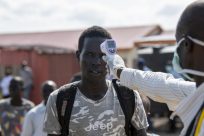
Press Release: UN and partners request $267.5 million to respond to humanitarian needs arising from COVID-19 Pandemic in Kenya
14 Apr 2020Nairobi, 9 April 2020 — The Government of Kenya, the United Nations and humanitarian partners have launched today a Flash Appeal requesting $267.5 million to respond to the most immediate and critical needs of 10.1 million people. Cabinet Secretary for National Treasury and Planning, Ukur Yatani Kanacho, said: “When times are […]
-
UNHCR supports Ethiopian refugees returning home from Kenya
19 Feb 2020NAIROBI, KENYA – Today, UNHCR, the UN Refugee Agency assisted 76 Ethiopian refugees currently living in Kenya to return home – marking the first-ever voluntary repatriation programme for a large group of Ethiopian refugees in Kenya. Currently, there are a total of 28,560 Ethiopian refugees in Kenya. “This is a […]
-
Mercy Masika, Elani and Avril to Perform at the LuQuLuQu Step for Safety Event to Rally Support for Refugees
2 Sep 2019Top Kenyan musicians, Mercy Masika, Avril and Elani are set to take part and perform in the Step for Safety public walk in Nairobi this September. The Step for Safety walk is an initiative of UNHCR, the UN Refugee Agency’s LuQuLuQu campaign. The campaign draws attention to the plight of […]
-
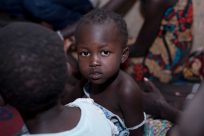
Aid appeals seek over $3 billion as South Sudan set to become Africa’s largest refugee and humanitarian crisis
1 Feb 2018“If the war doesn’t stop, refugee numbers will rise from 2.5 to three million in 2018.”
-

UNHCR’s Grandi appeals for urgent action as South Sudan crisis enters fifth year
13 Dec 2017Marking four years since the outbreak of South Sudan’s civil war, UN High Commissioner for Refugees Filippo Grandi today appealed for urgent action by all sides to settle the conflict and put an end to the country’s deepening humanitarian crisis and Africa’s largest refugee crisis. “The world cannot continue to […]
-
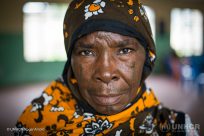
UNHCR report exposes the discrimination pervading the life of stateless minorities worldwide
3 Nov 2017“Stateless people are just seeking the same basic rights that all citizens enjoy.”
-

The FC Barcelona Foundation and UNHCR Launch Campaign in Support of Refugee Children
13 Jun 2017“The love of sport brings people together in a unique way. The passion and acceptance that comes from playing and supporting teams can dissolve differences. I hope this strengthened relationship with the FC Barcelona Foundation, will pave the way for a significant improvement of the lives of millions of refugee children and bring communities together,” said Grandi.
-
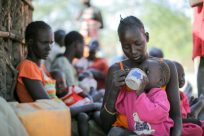
More than one million children have fled escalating violence in South Sudan
8 May 2017More than 75,000 refugee children in Uganda, Kenya, Ethiopia, Sudan and DRC have crossed South Sudan’s borders either unaccompanied or separated from their families.
-
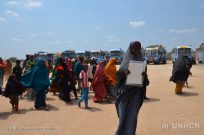
Nairobi to Host Special IGAD Summit on Somali Refugees
21 Mar 2017More than two million Somalis have been displaced in one of the world’s most protracted humanitarian crises that have now entered its third decade.
-

Unique EU Programme to Benefit Refugees and Host Communities in Kalobeyei
8 Feb 2017The objective of the programme is to improve health standards for the host communities and refugees in Kalobeyei, increase food and nutrition security and promote economic opportunities, increase school enrolment for children, improve child safety and well-being and increase social cohesion between refugees and host communities.
